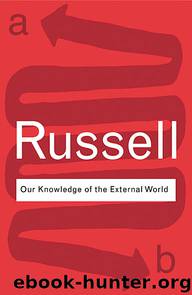Our Knowledge of the External World by Russell Bertrand

Author:Russell, Bertrand
Language: eng
Format: epub
Tags: Humanities
Publisher: Taylor & Francis
Published: 2009-03-02T05:00:00+00:00
5
THE THEORY OF CONTINUITY
The theory of continuity, with which we shall be occupied in the present lecture, is, in most of its refinements and developments, a purely mathematical subject—very beautiful, very important, and very delightful, but not, strictly speaking, a part of philosophy. The logical basis of the theory alone belongs to philosophy, and alone will occupy us to-night. The way the problem of continuity enters into philosophy is, broadly speaking, the following: Space and time are treated by mathematicians as consisting of points and instants, but they also have a property, easier to feel than to define, which is called continuity, and is thought by many philosophers to be destroyed when they are resolved into points and instants. Zeno, as we shall see, proved that analysis into points and instants was impossible if we adhered to the view that the number of points or instants in a finite space or time must be finite. Later philosophers, believing infinite number to be self-contradictory, have found here an antinomy: Spaces and times could not consist of a finite number of points and instants, for such reasons as Zeno’s; they could not consist of an infinite number of points and instants, because infinite numbers were supposed to be self-contradictory. Therefore spaces and times, if real at all, must not be regarded as composed of points and instants.
But even when points and instants, as independent entities, are discarded, as they were by the theory advocated in our last lecture, the problems of continuity, as I shall try to show presently, remain, in a practically unchanged form. Let us therefore, to begin with, admit points and instants, and consider the problems in connection with this simpler or at least more familiar hypothesis.
The argument against continuity, in so far as it rests upon the supposed difficulties of infinite numbers, has been disposed of by the positive theory of the infinite, which will be considered in Lecture 7. But there remains a feeling—of the kind that led Zeno to the contention that the arrow in its flight is at rest—which suggests that points and instants, even if they are infinitely numerous, can only give a jerky motion, a succession of different immobilities, not the smooth transitions with which the senses have made us familiar. This feeling is due, I believe, to a failure to realize imaginatively, as well as abstractly, the nature of continuous series as they appear in mathematics. When a theory has been apprehended logically, there is often a long and serious labour still required in order to feel it: it is necessary to dwell upon it, to thrust out from the mind, one by one, the misleading suggestions of false but more familiar theories, to acquire the kind of intimacy which, in the case of a foreign language, would enable us to think and dream in it, not merely to construct laborious sentences by the help of grammar and dictionary. It is, I believe, the absence of this kind of intimacy which makes
Download
This site does not store any files on its server. We only index and link to content provided by other sites. Please contact the content providers to delete copyright contents if any and email us, we'll remove relevant links or contents immediately.
| Anthropology | Archaeology |
| Philosophy | Politics & Government |
| Social Sciences | Sociology |
| Women's Studies |
The remains of the day by Kazuo Ishiguro(7543)
Tools of Titans by Timothy Ferriss(6938)
The Black Swan by Nassim Nicholas Taleb(6184)
Inner Engineering: A Yogi's Guide to Joy by Sadhguru(5888)
Giovanni's Room by James Baldwin(5873)
The Way of Zen by Alan W. Watts(5790)
The Six Wives Of Henry VIII (WOMEN IN HISTORY) by Fraser Antonia(4785)
The Power of Now: A Guide to Spiritual Enlightenment by Eckhart Tolle(4749)
Astrophysics for People in a Hurry by Neil DeGrasse Tyson(4614)
Asking the Right Questions: A Guide to Critical Thinking by M. Neil Browne & Stuart M. Keeley(4567)
12 Rules for Life by Jordan B. Peterson(3724)
The Ethical Slut by Janet W. Hardy(3494)
Skin in the Game by Nassim Nicholas Taleb(3456)
Housekeeping by Marilynne Robinson(3397)
The Art of Happiness by The Dalai Lama(3378)
Double Down (Diary of a Wimpy Kid Book 11) by Jeff Kinney(3267)
Skin in the Game: Hidden Asymmetries in Daily Life by Nassim Nicholas Taleb(3259)
Walking by Henry David Thoreau(3228)
12 Rules for Life: An Antidote to Chaos by Jordan B. Peterson(3196)
